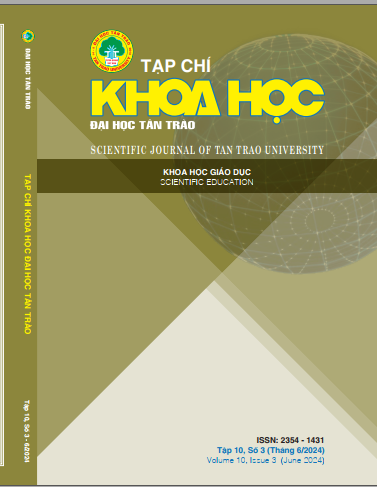RANKINGS AND QUALITY ASSURANCE OF HIGHER EDUCATION IN VIETNAM
DOI:
https://doi.org/10.51453/2354-1431/2024/1155Keywords:
university rankings, quality assurance, quality assessment, higher educationAbstract
University rankings have become a phenomenon that attracts a lot of attention from those interested in higher education in Vietnam. Rankings are increasingly popular and have a great impact on the operations of higher education institutions, state management as well as the direction of society. Many interested people are still very confused about the criteria of the rankings and especially the relationship between the rankings and the actual training quality of higher education institutions. Through research on quality assurance of higher education and analyzing the criteria of today's most popular rankings, we clarify the differences between university rankings, and at the same time we clarify the challenges and impacts of rankings on higher education stakeholders. From these analyses, we provide notes for stakeholders interested in university rankings. The results of this study help us see more clearly the benefits and impacts of university rankings, especially the relationship between rankings and quality assurance of higher education. The results of this research help stakeholders in higher education (including training institutions) have a better approach to university rankings.
Downloads
References
ARWU (Academic Ranking of World Universities) (2023). ShanghaiRanking's Academic Ranking of World Universities Methodology 2023. https://www.shanghairanking.com/methodology/arwu/2023 (truy cập 11/3/2024).
Brown, R (2004). Quality Assurance in Higher Education: The UK Experience Since 1992 (1st ed.). Routledge. https://doi.org/10.4324/9780203416327.
Dill, D.D., & Soo, M (2005). Academic quality, league tables, and public policy: a cross-national
analysis of university ranking systems. Higher Education, Vol. 49 No. 4, pp. 495-533.
Federkeil, G (2008). Rankings and Quality Assurance in Higher Education. Higher Education in Europe, 33:2-3, pp. 219-231. DOI: 10.1080/03797720802254023.
Kauppi, N (2018). The global ranking game: narrowing academic excellence through numerical objectification. Studies in Higher Education, Vol. 43 No. 10, pp. 1750-1762.
Komotar, M.H (2020). Discourses on quality and quality assurance in higher education from the perspective of global university rankings. Quality Assurance in Education, Vol. 28 No. 1, pp. 78-88. DOI 10.1108/QAE-05-2019-0055.
Liu, S (2020). Can ranking contribute to the quality assurance of higher education? An examination of the Chinese Disciplinary Ranking. Cambridge Journal of Education.
DOI: 10.1080/0305764X.2020.1829548.
Nghiem, X.H., Tran T.H., Phung X.D., Ngo T.N., Ngo T.H., & Vu H.P (2022). General Issues Regarding Quality Assurance, Accreditation, and Benchmarking. Documentation for Quality Assurance and Accreditation Activities in Higher Education, Vietnam Ministry of Education and Training.
QS (Quacquarelli Symonds) (2023). QS World University Rankings - previous methodology. Available at: https://support.qs.com/hc/en-gb/articles/9051022681500-QS-World-University-Rankings-previous-methodology (accessed 23 January 2024).
QS (Quacquarelli Symonds) (2023). QS World University Rankings methodology: Using rankings to start your university search. Available at: https://www.topuniversities.com/qs-world-university- rankings/methodology (accessed 26 March 2024).
QS (Quacquarelli Symonds) (2023). QS World University Rankings. Available at: https://support.qs.com/hc/en-gb/articles/4405955370898-QS-World-University-Rankings?__hsfp=137
&__hssc=238059679.1.1711440451051&__hstc=238059679.58b652767155d40180394fb66a4424ce.1711440451050.1711440451050.1711440451050.1 (accessed 26 March 2024).
THE (Times Higher Education) (2023). World university rankings 2023: methodology. Available at: https://www.timeshighereducation.com/world-university-rankings/world-university-rankings-2023-methodology (accessed 10 March 2024).
The Communist Party of Vietnam (2023). The eighth plenum of the 13th Party Central Committee of the Communist Party of Vietnam adopted a resolution aimed at “continuing to build and enhance the role of intellectuals in meeting the requirements for rapid and sustainable national development in the new phase.” https://tulieuvankien.dangcongsan.vn/he-thong-van-ban/van-ban-cua-dang/nghi-quyet-so-45-nqtw-ngay-24112023-hoi-nghi-lan-thu-tam-ban-chap-hanh-trung-uong-dang-khoa-xiii-ve-tiep-tuc-xay-dung-va-9941.
UNESCO (2013). Quality assurance in higher education. Education sector technical notes.
UPM (University Performance Metrics) (2024). UPM overview. Available at: https://upm.vn/about/upmRating (accessed 23 January 2024).
Vietnam Ministry of Education and Training (2022). The program "Development of the Quality Assurance and Accreditation System for Higher Education and Teacher Training Colleges for the Period 2022-2030" (approved by the Prime Minister in Decision No. 78/QĐ-TTg dated January 14, 2022).
VNUR (Viet Nam university rankings) (2023). Phương pháp xếp hạng VNUR 2023. Available at: https://vnur.vn/phuong-phap-xep-hang (accessed 23 January 2024).
VNUR (Viet Nam university rankings) (2024). Phương pháp xếp hạng VNUR 2024. Available at: https://vnur.vn/phuong-phap-xep-hang-vnur-2024 (accessed 23 January 2024).
Downloads
Published
How to Cite
Issue
Section
License

This work is licensed under a Creative Commons Attribution-ShareAlike 4.0 International License.
All articles published in SJTTU are licensed under a Creative Commons Attribution-ShareAlike 4.0 International (CC BY-SA) license. This means anyone is free to copy, transform, or redistribute articles for any lawful purpose in any medium, provided they give appropriate attribution to the original author(s) and SJTTU, link to the license, indicate if changes were made, and redistribute any derivative work under the same license.
Copyright on articles is retained by the respective author(s), without restrictions. A non-exclusive license is granted to SJTTU to publish the article and identify itself as its original publisher, along with the commercial right to include the article in a hardcopy issue for sale to libraries and individuals.
Although the conditions of the CC BY-SA license don't apply to authors (as the copyright holder of your article, you have no restrictions on your rights), by submitting to SJTTU, authors recognize the rights of readers, and must grant any third party the right to use their article to the extent provided by the license.


